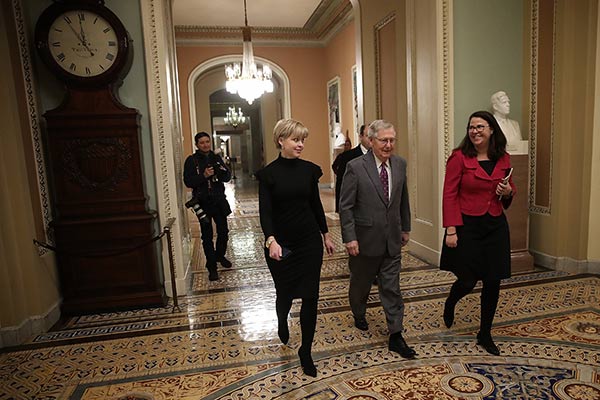US Congress votes to reopen govt


Hours-long federal freeze was second shutdown in three weeks
WASHINGTON-The House moved swiftly early on Friday to reopen the federal government and pass a $400 billion budget deal, overcoming opposition from both liberal Democrats and tea party conservatives to endorse enormous spending increases despite looming trillion-dollar deficits.
The 240-186 vote came in the pre-dawn hours, putting to bed a five-and-a-half-hour federal freeze that relatively few would notice. Many who did quickly labeled it a pointless, head-scratching episode. The shutdown was the second in three weeks.
The breakdown came largely in the Senate, when after a day of inaction, Republican Senator Rand Paul went rogue and stalled a vote in protest over his party's willingness to bust the budget. But Democrats also had their divisions and wrangling, largely with liberals upset the measure was not tied to any plans to assist "Dreamer" immigrants.
Most Democrats opposed the measure, following the lead of Minority Leader Nancy Pelosi, who tried and failed to use the moment to secure a promise for a separate vote on immigration. Up to the final minutes, it was not clear the bill would pass and many Democrats held their votes, allowing the tally to creep slowly and giving no indication which way it might fall.
House Speaker Paul Ryan urged Congress to avoid a "second needless shutdown in a matter of weeks-entirely needless".
There was far less drama in the Senate, where the measure sailed through by a 71-28 tally. President Donald Trump has promised to sign the bill into law.
The White House was forced to order the government shutdown shortly after midnight, but leaders quickly hustled to move before federal employees were due back at work, hoping to minimize the disruption. A shutdown essentially cuts the federal workforce in half, with those dubbed nonessential not allowed to work, while military and essential workers remain on the job.
The House vote ensured most employees would report for work as usual.
The White House kept its distance from the quarreling on Capitol Hill. Trump did not tweet and aides did not try to assign blame.
Senate GOP leaders, however, were irked by the debacle. In his attempt to sway Paul to relent, Senator John Cornyn declared his fellow Republican was "wasting everyone's time" and prompting a shutdown for "no good reason".
But Paul repelled suggestions to stand aside. "I didn't come up here to be part of somebody's club. I didn't come up here to be liked," Paul said.
The budget agreement is married to a six-week temporary funding bill needed to keep the government operating and to provide time to implement the budget pact.
The bill includes huge spending increases sought by Republicans for the Pentagon along with a big boost demanded by Democrats for domestic agencies. Both sides pressed for $89 billion for disaster relief, extending a host of healthcare provisions, and extending a slew of smaller tax breaks.
It also would increase the government's debt cap, preventing a first-ever default on US obligations that looms in just a few weeks. Such debt limit votes are usually enormous headaches for GOP leaders, but the increase means another vote won't occur before March 2019.
Senate leaders had celebrated the budget deal as a sign they had left behind some of their chronic dysfunction. Just three weeks ago, Senate Democrats sparked a three-day partial government shutdown by filibustering a spending bill, seeking relief for "Dreamer" immigrants who've lived in the country illegally since they were kids.
Senate Democrats had no appetite for another shutdown.
House GOP leaders shored up support among conservatives for the measure, which would shower the Pentagon with money but add hundreds of billions of dollars to the nation's $20 trillion-plus debt.
House Democratic leaders opposed the measure arguing it should resolve the plight of Dreamers but not with all their might. Pelosi made it plain she wasn't pressuring her colleagues to kill the bill, which is packed with money for party priorities like infrastructure, combating opioid abuse and helping college students.
Ryan said on again Thursday he was determined to bring an immigration bill to the floor this year albeit only one that has Trump's blessing.
The episode was a clear defeat for those who had followed a risky strategy to use the party's leverage on the budget to address immigration. Protection for the Dreamers under former president Barack Obama's Deferred Action for Childhood Arrivals program, or DACA, formally expires next month and there's no sign that lawmakers are making progress on an agreement to extend the program.
AP-Reuters
































